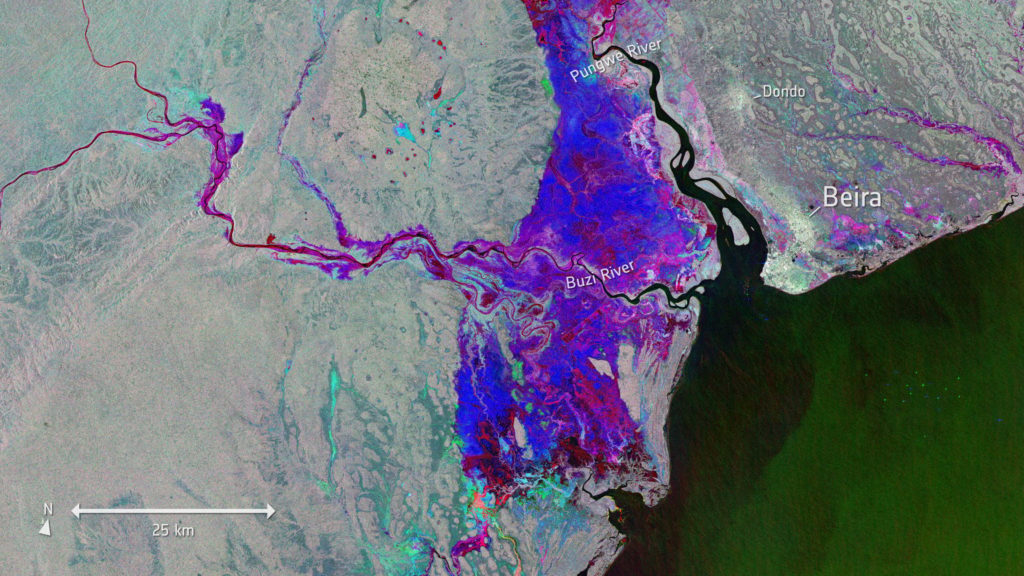International relief organizations are responding to an increasingly devastating humanitarian crisis after a tropical storm and powerful cyclone tore across Mozambique, Zimbabwe and Malawi. Current estimates confirmed by President Filipe Nyusi indicate that some 1,000 people may have been killed in Mozambique alone.
“Officially, we have a record of more than 84 dead but everything indicates that we can have a record of more than 1,000 dead,” Nyusi said, adding, “100,000 people are in danger.”
An official from the UN’s weather agency noted that the situation resulting from Cyclone Idai is “shaping up to be one of the worst weather-related disasters ever to hit the southern hemisphere.”
In Malawi, the humanitarian situation is also extremely severe, with villages swept away and thousands stranded on roofs of schools and homes.
“In terms of far-reaching impact, it is impossible to estimate the levels of damage,” Malawi-based international development consultant, David Bargh, told Faithwire. “It’s terrible. Whole villages are gone.”
‘Towns are like islands’
The “epicenter of the storm,” Bargh said, struck the absolutely vital Mozambican port of Beira.
“That’s where all the freight comes in,” he explained. “It is a keystone port in the region for imports and export of agricultural commodities.”
Now, all the surrounding towns and villages are underwater, making it impossible for food, goods and relief supplies to be shipped to those in need.
“Towns are like islands,” he said. “Crops are destroyed.”
“Much of the population could be nine months without food,” said Bargh, who is based in the southern Malawian city of Blantyre. “Most of the people who have died are in Blantyre.”
Bargh noted that the government will now be forced to purchase vital foodstuffs from neighboring countries — a costly and logistically challenging feat.
“The government will have to buy maize from Zambia,” he added, noting that he estimates approximately 900,000 Malawians are “directly affected” by the flooding.
Bargh said that helicopter rescues were ongoing, but that, in many cases, there were too many people looking to be rescued, and the aircraft had to move on — a heartbreaking reality of conducting rescue operations on such an enormous scale.
“A number of the hydroelectric power plants were down,” Bargh explained, but “many have now come back online, which is promising.”
Still, it has become extremely difficult to move aid, because the “roads and bridges could not withstand the floodwaters” he added.
The development expert noted that “local fuel stations are flooded and open sewer systems are overflowing.”
Bargh, who works for a company specializing in sustainable fish-farming, said the storm has directly affected many of the local farmers who rely on the lakes and ponds to sustain their businesses and food supply.
“Two of my farmers had their ponds flooded and lost all the fish they’ve been farming for the last six months,” he said.
“Some of these people don’t know where their villages have gone,” he said. “It has all been destroyed. It’s all gone.”
Community pulling together despite the devastation, Bargh said that the local community has been banding together to help each other through the crisis — exchanging food, clothes and blankets.
It is “encouraging to see people gathering together and responding to the aid of those in need,” he said, adding that he would shortly be traveling down to some of the low-lying villages nearby alongside a team from the UN’s World Food Programme, to further assess the situation.
One hotel in Zimbabwe is providing free shelter for those displaced by the cyclone. Speaking to BBC Focus on Africa radio, Mandla Mataure, the general manager of Chimanimani Hotel, shared what his business is doing to help:
From the first night we have been sheltering about 400 people. It’s families — men, women, children who were just stranded and had nowhere to go after their homes were destroyed.
So we’ve opened up our doors: we’ve got a big enough conference room and lounge for people to sleep — camping style, at least until we can get something more semi-permanent.
We’re cooking pretty much on open fires – last night [Monday] we fed 390 people.
A lot of people feel safer here [at night], maybe going back during the day to the areas where their homes were to try and salvage whatever they can find.
‘Please pray’
“It is a total mess here. Please pray for the thousands and thousands who have lost their homes,” Jill Lovell, an Australian who runs a mission school in Beira, told The Guardian. “People are in trees and on rooftops. Emergency relief crews are slowly coming in. Rains continue to make it all even harder. So many lives lost and homes destroyed.”
“People are terrified,” said Vernon Brewer, founder and CEO of World Help in a statement, calling for prayer. “They’re wondering if their lives will ever be the same. Please stop whatever you’re doing and pray on behalf of families impacted by this cyclone.”
“Yes, we must provide help so they may survive this disaster, but we also must send them hope through our prayers so they know they are not forgotten and they still have a future,” he said.
Please keep all those affected by this dreadful situation in your prayers.
To read more news on Zimbabwe on Missions Box, go here.
